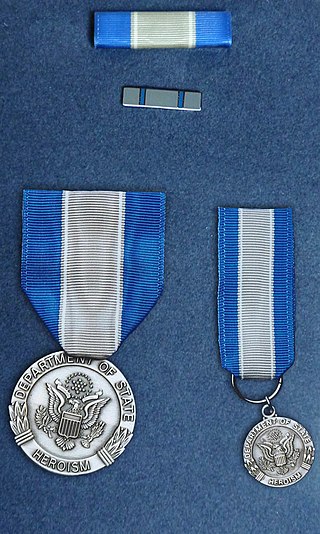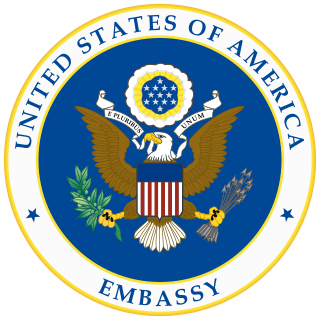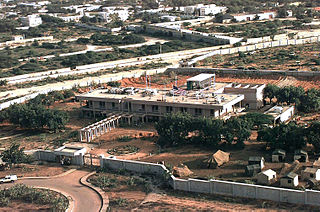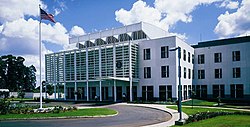
A diplomatic mission or foreign mission is a group of people from a state or organization present in another state to represent the sending state or organization officially in the receiving or host state. In practice, the phrase usually denotes an embassy or high commission, which is the main office of a country's diplomatic representatives to another country; it is usually, but not necessarily, based in the receiving state's capital city. Consulates, on the other hand, are smaller diplomatic missions that are normally located in major cities of the receiving state. As well as being a diplomatic mission to the country in which it is situated, an embassy may also be a nonresident permanent mission to one or more other countries.

The United States Department of State (DOS), or simply the State Department, is an executive department of the U.S. federal government responsible for the country's foreign policy and relations. Equivalent to the ministry of foreign affairs of other nations, its primary duties are advising the U.S. president on international relations, administering diplomatic missions, negotiating international treaties and agreements, and representing the U.S. at the United Nations. The department is headquartered in the Harry S Truman Building, a few blocks from the White House, in the Foggy Bottom neighborhood of Washington, D.C.; "Foggy Bottom" is thus sometimes used as a metonym.

The United States Department of State Bureau of Overseas Buildings Operations (OBO) is responsible for overseeing the construction, management, and operations of U.S. diplomatic facilities around the world.
The United Nations Office at Nairobi in Nairobi, the capital of Kenya, is one of four major United Nations office sites where numerous different UN agencies have a joint presence. Established in 1996, it is the UN's official headquarters in Africa.

The 1998 United States embassy bombings were attacks that occurred on August 7, 1998. More than 220 people were killed in two nearly simultaneous truck bomb explosions in two East African capital cities, one at the United States embassy in Dar es Salaam, Tanzania, and the other at the United States embassy in Nairobi, Kenya.

The Embassy of the United States of America in Manila is the diplomatic mission of the United States in the Philippines. Its chancery is situated by Roxas Boulevard in Ermita, City of Manila. The Embassy has been representing the United States Government since the Philippines was granted independence on July 4, 1946.

The Award for Heroism is an award of the United States Department of State. It is presented to employees of State, USAID and Marine guards assigned to diplomatic and consular facilities in recognition of acts of courage or outstanding performance under unusually difficult or dangerous circumstances, whether or not in connection with the performance of assigned duties.

Somalia–United States relations are bilateral relations between the Federal Republic of Somalia and the United States of America. Somalia has an embassy in Washington, D.C., and the United States maintains an embassy in Mogadishu which was reopened in late 2019.

A chancery is the principal office that houses a diplomatic mission or an embassy. This often includes the associated building and the site. The building can house one or several different nations' missions. The term derives from chancery or chancellery, the office of a chancellor. Some nations title the head of foreign affairs a chancellor, and 'chancery' eventually became a common referent to the main building of an embassy.

The Thomas Jefferson Star for Foreign Service is an award of the United States Department of State. It is presented to employees of State, USAID, and civilian contractors assigned to diplomatic and consular facilities for events that lead to death or serious illness or injury. It is roughly comparable to the U.S. military's Purple Heart, but since the criteria for the award is so strict, nearly all of them are awarded posthumously.

The Embassy of the United States to the Kingdom of Denmark is the diplomatic mission of the United States in Denmark. The building is located on Dag Hammarskjölds Allé, in Indre Østerbro, Copenhagen, and it was opened in May 1954. The embassy also oversees American interests in Greenland. On 10 June 2020, the United States reopened its consulate in Nuuk, Greenland.

Jonathan Philp is an Australian diplomat and career officer with the Department of Foreign Affairs and Trade.

The Embassy of the United States of America to Somalia is a diplomatic mission of the United States in Mogadishu, Somalia from 1960 to 1991. In 1957, the US opened a consulate-general in Mogadishu—the capital of the Trust Territory of Somalia, a UN trusteeship under Italian administration. The consulate was upgraded to embassy status in July 1960, when the US recognized Somalia's independence and appointed an ambassador. The embassy served to counter Soviet influence during the Cold War and also served as a base for the United States Agency for International Development, which had a large presence in the country. In 1989, the embassy moved from a dilapidated building in central Mogadishu to a new compound on the outskirts of the city.
Gigiri is a residential estate in Nairobi. It is home to Kenya's large expatriate community. It is one of the largest expat communities in Africa. Gigiri hosts:















